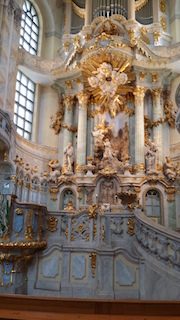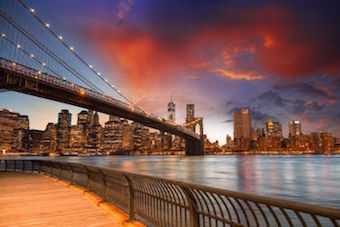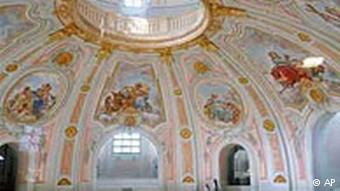LETTERS FROM THE GLOBAL PROVINCE
Will Greatness and Germany Ever Dance Again? Global Province Letter, 20 September 2017

Dresden: Divine Fire in the Ashes. On August 21, 2017, we were perched on a pew of the Frauenkirche in Dresden, Germany. My companion said, most aptly, "We're not in a church: we're in an opera house." He was spot on: this is an extravagantly devout reverence to the Creator, wondrously beautiful in a country that is not beautiful, gloriously calming amidst a people with a troubled soul. Its history is remarkable.
Allied bombings in World War II left Dresden in tatters. Poor Dresden suffered further after the war as the decapitated capital of Saxony, still shattered, blighted by the machinations of the DDR, an outpost of the Soviet intrusion into Europe. The Communist rulers kept the church in smithereens. With the reunion of Germany, funds were gathered for its resurrection, and its rebuilding got under way in 1992. It finally was reconsecrated in 2005. Perhaps in all of Germany, it is the best symbol of aspiration and hope, a reaching into the heavens that says this country could get beyond its materialism and fretful survivalism. It is inspiration incarnate.

The Once Great Germany.
It is hard to remember perhaps that Germany once had greatness, before it fell into the 21st century of war and destructiveness from which Germany still has not recovered. This is the country that produced Alexander von Humboldt, arguably the 19th century's greatest scientist, most recently celebrated in a fine tome by Andrea Wulf called The Invention of Nature: Alexander von Humboldt's New World. The work of George Wilhelm Friedrich Hegel also culminated in the first half of the 19th century, enough so that he was the mentor of John Roebling, American's great bridge czar and creator of the Brooklyn Bridge. It is fair to say that Hegel's thinking had enough breadth and global sweep that it changed the world's landscape, providing impetus to Roebling in the New World. Big ideas produce big men.
But Germany in the 20th lost its way and gave up any claims to greatness. It is still not recovered, as we will detail in future letters.
Germany's Hope. Our view would be that it will not see the top of the mountains and the sweep of the universe again if it relies on ordinary German manhood. The inventive people we find in Germany are hardworking immigrants. It is not the Turks, of whom there are a huge number: they have been as troublesome as they have been helpful. But Ammra from Pakistan studies medicine at night in Germany and plans to launch a world public health career there. Rachel from Somalia rushes off to Luxembourg for a weekend and urges us to visit there: she is an explorer who will break the ordinary boundaries. Sabrina from Vancouver can make consistently good espresso, showing more care and finesse than her German colleagues. They and other imports like them just might push insular Germany outside its borders in the right way, pushing against the compulsive risk-averse caution of Angela Merkel, the able current German leader who was brought up on a diet of fear and caution in the DDR. The newcomers might help Germany finally rediscover itself, going beyond the ponderous diet of Erhard prosperity, which has both rebuilt Germany, but also brought mindless inertia into the German brain.

P.S. The Three Stone Cutters. We would suppose that Germany is in need of more cathedral builders. A traveler came upon three individuals working with stone. Curious as to what these workers were doing, the traveler approached the first worker and asked, "What are you doing?" Without the slightest hesitation, the worker replied, "I am a stone cutter and I am cutting stones." Still unclear about the workers' task, the traveler approached the second worker and asked the same question. To this the second worker thought for a moment, gazed briefly at the traveler and explained, "I am a stone cutter and I am cutting stones to earn money to support my family." Perplexed by the two different responses, the sojourner approached the third worker and asked, "What are you doing?" Stopping for a moment, the worker stared at the stone in his hand, slowly turned to the traveler, and said, "I am a stone cutter and I AM BUILDING A CATHEDRAL."
Home - About This Site - Contact Us
Copyright 2017 GlobalProvince.com